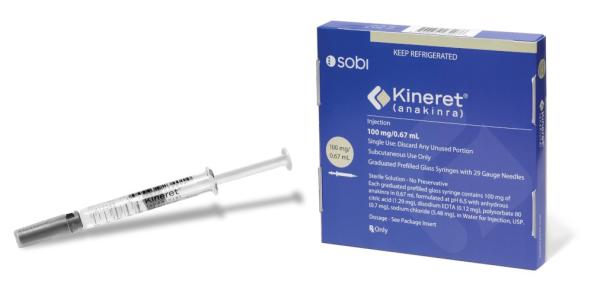Anakinra Disease Interactions
There are 4 disease interactions with anakinra.
Anakinra (applies to anakinra) infections
Moderate Potential Hazard, Moderate plausibility. Applicable conditions: Tuberculosis -- Latent, Infection - Bacterial/Fungal/Protozoal/Viral, Immunodeficiency
Anakinra has been associated with an increased incidence of serious infections in clinical trials in rheumatoid arthritis (RA). RA therapy should be discontinued if a patient develops a serious infection. In neonatal-onset multisystem inflammatory disease (NOMID) and deficiency of interleukin-1 receptor antagonist (DIRA) patients treated with anakinra, the risk of a disease flare when discontinuing this drug should be weighed against the potential risk of continued therapy. Anakinra should not be started in patients with active infections. Safety and efficacy have not been evaluated in immunosuppressed patients or in patients with chronic infections; caution is recommended when using anakinra in these patients.
Drugs that affect the immune system by blocking tumor necrosis factor have been associated with an increased risk of reactivation of latent tuberculosis; it is possible that taking drugs that block interleukin-1 (such as anakinra) increases the risk of tuberculosis or other atypical or opportunistic infections. The current US CDC guidelines should be followed both to evaluate for and to treat possible latent tuberculosis before starting therapy with anakinra.
Anakinra (applies to anakinra) liver disease
Moderate Potential Hazard, Moderate plausibility.
No formal studies have been conducted examining the pharmacokinetics of anakinra administered subcutaneously in patients with hepatic dysfunction. Caution is recommended when using anakinra in these patients.
Anakinra (applies to anakinra) neutropenia
Moderate Potential Hazard, Moderate plausibility.
The use of anakinra has been associated with a decrease in neutrophil counts. Neutrophil counts should be assessed prior to initiating therapy and while receiving therapy, monthly for 3 months and thereafter quarterly for up to 1 year.
Anakinra (applies to anakinra) renal deficiency
Moderate Potential Hazard, Moderate plausibility. Applicable conditions: Renal Dysfunction
Anakinra is substantially excreted by the kidney. The risk of toxic reactions to this drug may be greater in patients with impaired renal function. Administration of the prescribed dose every other day should be considered for patients who have severe renal dysfunction or end-stage renal disease (defined as CrCl less than 30 mL/min [as estimated from serum creatinine levels]). Caution should be exercised when using anakinra in these patients.
Switch to professional interaction data
Anakinra drug interactions
There are 523 drug interactions with anakinra.
More about anakinra
- anakinra consumer information
- Check interactions
- Compare alternatives
- Reviews (18)
- Side effects
- Dosage information
- During pregnancy
- Drug class: antirheumatics
- Breastfeeding
- En español
Related treatment guides
Drug Interaction Classification
| Highly clinically significant. Avoid combinations; the risk of the interaction outweighs the benefit. | |
| Moderately clinically significant. Usually avoid combinations; use it only under special circumstances. | |
| Minimally clinically significant. Minimize risk; assess risk and consider an alternative drug, take steps to circumvent the interaction risk and/or institute a monitoring plan. | |
| No interaction information available. |
See also:
Further information
Always consult your healthcare provider to ensure the information displayed on this page applies to your personal circumstances.


